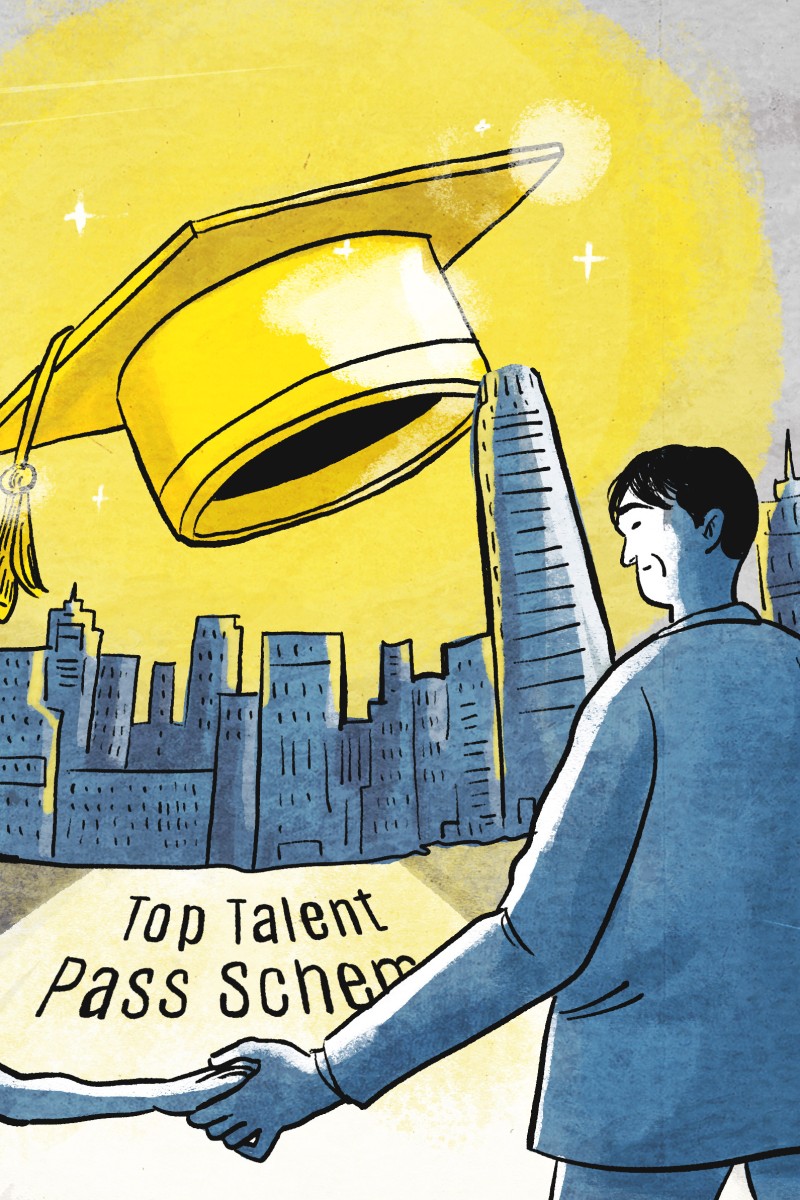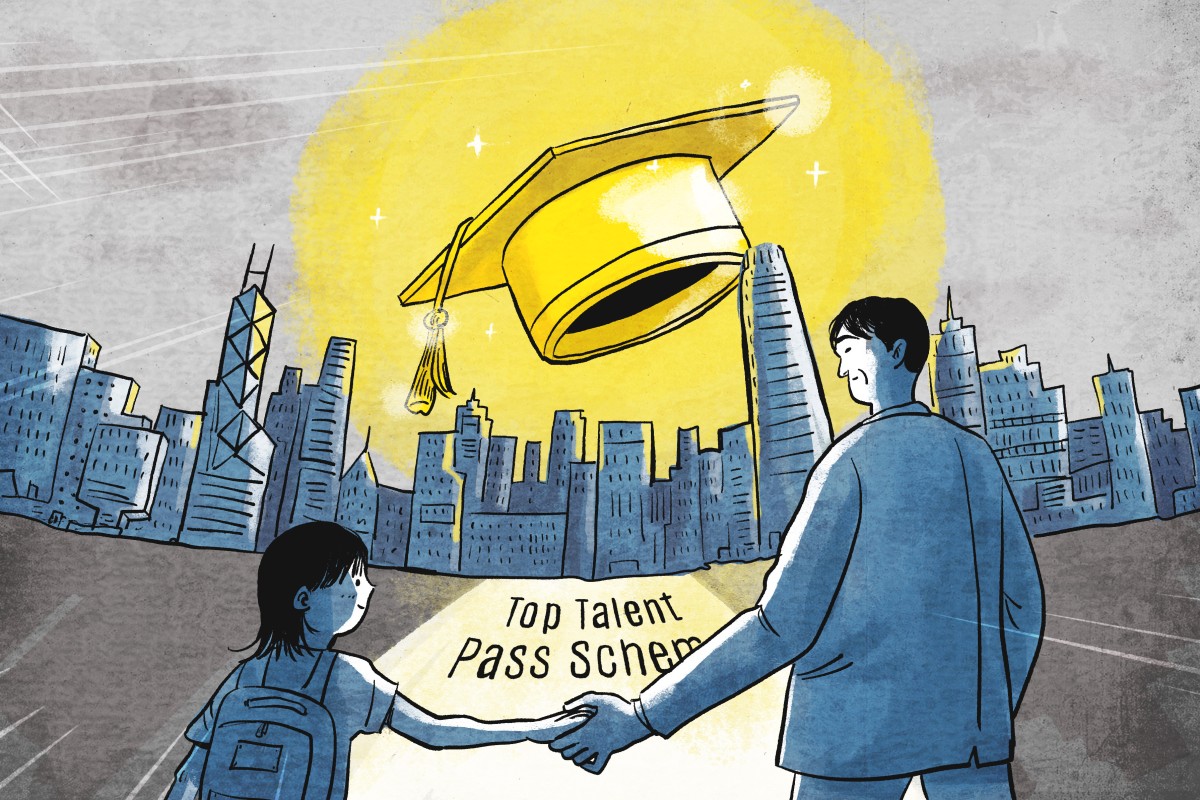
Spark Deep Dive: Top Talent Pass Scheme brings highly-skilled workers to Hong Kong, but are there enough jobs?
Many people are competing for jobs, and issues like mainland China’s rules for bank transfers create obstacles for those starting businesses.
 Many people are moving to Hong Kong under the Top Talent Pass Scheme only to find there aren’t enough jobs to go around. Photo: SCMP Graphics
Many people are moving to Hong Kong under the Top Talent Pass Scheme only to find there aren’t enough jobs to go around. Photo: SCMP GraphicsDeep Dive delves into hot issues in Hong Kong and mainland China. Our easy-to-read articles provide context to grasp what’s happening, while our questions help you craft informed responses. Check sample answers at the end of the page.
News: More than 80,000 people receive visas under Top Talent Pass Scheme, but many cannot find jobs
-
Authorities launched the scheme in December 2022 to counter the city’s brain drain
-
Competition is high for many jobs, and the employment rate for top talent from recognised universities sits at around 50 per cent
Hong Kong launched its Top Talent Pass Scheme in December 2022. The goal of the scheme is to attract top graduates from around the globe. It also wants to bring professionals and people who want to start their own businesses. Authorities hope it could counter the city’s brain drain following the Covid-19 pandemic.
By September 30 of this year, 81,463 two-year visas had been approved. The city’s Immigration Department received 100,972 applicants, more than the original target of 35,000 yearly. A total of 66,109 visa recipients have already arrived in Hong Kong.
However, getting a visa doesn’t guarantee a job. A government source said the employment rate for top talent from the list of recognised universities was around 50 per cent.
Kira Xiong is a 23-year-old finance graduate from Shenzhen. She has degrees from universities in Melbourne and Sydney. She arrived in Hong Kong in July and hoped to find a job in finance.
Xiong spent nearly three months sending out more than 100 resumes. She also lowered her salary expectations and considered work not related to her majors. Finally, she found an administrative job in a local company.
Cambridge economics graduate Peter Zhang, 24, secured a junior financial analyst position in March. It took him six months to find a job. He sent more than a dozen resumes.
At one job interview, he competed with over 100 candidates for three available junior positions. Nearly half of them were also top talent visa holders.
Meanwhile, Liang Jin, 52, came to Hong Kong to expand his new energy battery business.
But he had a big problem. There are strict mainland capital controls and no designated remittance channels for those in the top talent scheme.
Mainland rules allow individuals to transfer a maximum of US$50,000 (HK$389,127) per year. People can carry 20,000 yuan (HK$21,500 or US$2,810) in cash each time they cross the border.
They can also withdraw up to 100,000 yuan (HK$107,497 or US$13,810) yearly from mainland accounts in Hong Kong.
Desperate to fund his business, Liang maxed out the annual bank transfer limit. He made weekly trips between Shenzhen and Hong Kong for several months, carrying the maximum 20,000 yuan on every trip.
He also applied for local funds for business owners. He arranged for his mainland employees to work in Hong Kong on business visas instead of hiring locally to keep costs down.
“Without easy access to our money, we’re forced to seek local funds and hire no local people,” Liang said.
Question prompts
1. Which of the following is true based on the news?
(1) Hong Kong exceeded its target for scheme applicants by more than 20,000.
(2) Many top talent visa holders are forced to lower their salary and work expectations to find a job.
(3) Mainland individuals in Hong Kong can transfer a maximum of US$50,000 a year
(4) The employment rate for those in the top talent scheme is around 30 per cent.
A. (1), (3) only
B. (2), (3) only
C. (2), (4) only
D. (1), (4) only
2. Based on the information in the news and your own knowledge, why are top talent visa recipients struggling to find work?
3. What obstacles did Liang face in his career path as a Top Talent Pass Scheme recipient?
Cartoon
Question prompts
1. What does this cartoon say about the Top Talent Pass Scheme?
2. Based on the news and your knowledge, how might top talent visa holders feel about their employment struggles?
Glossary
Top Talent Pass Scheme: an initiative designed to attract highly skilled individuals worldwide to Hong Kong. Graduates from the world’s top universities and individuals with specific professional skills or work experience can apply for a two-year visa to live and work in Hong Kong
brain drain: when many educated and highly skilled people leave their homes to live and work somewhere else, often because the pay and conditions are better
capital controls: policies put in place by the government or another regulatory body to limit how much foreign money goes in and out of the local economy.
remittance: the transfer of money, usually across borders and to a different country.
Sample answers
News
1. B
2. Hong Kong aimed to bring in 35,000 top talent visa holders each year for the past two years, yet that number has exceeded 80,000. There are simply too many qualified candidates applying for a limited number of jobs. Few of them will actually be able to get the jobs they want and are qualified for.
Both Zhang and Xiong are examples of this. Xiong sent out more than 100 resumes to settle for a job below her expectations, while Zhang found that he was competing with around 100 other candidates for three available positions.
3. Liang, who was looking to expand his business, struggled because of strict mainland capital controls and no designated remittance channels. There are limitations to how much money he can transfer and withdraw. This is a huge setback for someone running a business, and Liang was forced to travel to and from Shenzhen weekly to get past these restrictions. This left him feeling burnt out.
Cartoon
1. The cartoon implies that the talent scheme looks desirable from the outside, as portrayed by the man standing with open arms in front of the Top Talent Pass Scheme sign. The man has a glowing halo, indicating the supernatural nature of the scheme. In reality, visa holders may struggle to succeed, as portrayed by the money bags hidden within the Top Talent Pass Scheme maze.
2. The top talent visa holders likely feel frustrated, burnt out, and misled. The scheme promised great opportunities in Hong Kong, yet most of the visa holders are either unemployed or settled for a job below their salary and status expectations.
